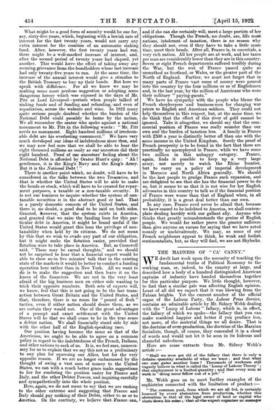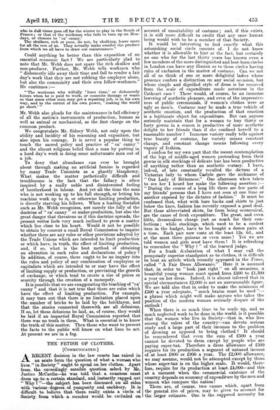TFIE MADNESS OF " CA' CANNY."
WE dwelt last week upon the necessity of teaching the fundamental truths of Political Economy to the working man, or, indeed, to the country at large, and described how a body of a hundred distinguished American captains of industry have banded themselves together for this particular .purpose. We little thought, however, to find that a similar gale was affecting English opinion. Least of all 'did we expect that it was blowing from the Fabian heights. Yet the current number of the official organ of the Labour Party, the Labour Press Service, contains an admirable article by Mr. Sidney Webb dealing with the " Lump of Labour "'fallacy, which is, in effect, the fallacy of -which -we spoke—the fallacy that you can make mankind happier and better if you produce less, not more, of the material things we all desire. that is the doctrine of over7production, the doctrine of theMarxian Socialists, though, of course, they concealed it, in ,a cloud of words and would not let it be seen in its hideous and shameful nakedness.
Here are some -extracts 'from Mr. -Sidney Webb's , article
aver get rid of. the fallacy that there is •only definite. quantity available of what we - want ; and that what one .man gams another loses ? Thousands of workmen still vaguely believe in what is called the ' Lump of Labour Theory ' ; that employment is. a limited qUantity ; and that every man at vxorkle 80111046110r out-of a job.' "
Mr. 'Webb goes on to meet further examples 'of the 'sophistries connected with the limitation of product
Tho.common pool, from which we are all fed, is certainly
lessened every abstention from production, whether this abstention -rs • that • Of the legal owner of land or capital who shutaidown .bis mine , t that, .ofothweitport orgaamor Sel:osnger who in dull times goes off for the winter to play in the South of France ; or that of the workman who fails to turn up on Mon- days, or chooses to ' ca' canny.'
The skulkersi rich or poor, do not, by skulking, leave more for all the rest .of us. They actually make smaller the product from which we all have to draw our maintenance."
Could anything be better than this exposition of an essential economic fact ? We are particularly glad to note that Mr. Webb does not spare the rich skulker and non-producer. Further, Mr. Webb tells workmen who " dishonestly idle away their time and fail to render a fair day's work that they are not robbing the employer alone, but also the community and their own fellow-workmen." He continues :—
"The workman who wilfully ' loses time,' or dishonestly loiters when he is paid to work, or commits damage or waste so that some other man may get a repairing job, is in his own way, and to the extent of his own power, making the world go short.' "
Mr. Webb also pleads for the maintenance in full efficiency of all the nation's instruments of production, human as well as. animal or mechinical, as the first charge on the common -product.
We congratulate Mr. Sidney Webb, not only upon the ability and lucidity of his reasoning and exposition, but also upon his courage. It is never a popular thing to touch . the sacred. policy and practice of " ca' canny " and the almost religious belief that a man by putting in a hard day's work is doing some unfortunate man out of a. job.
. To deny that abundance can ever be brought about through making an artificial famine is regarded by many Trade Unionists as a ghastly blasphemy. What makes the matter pathetically difficult and troublesome is_ the fact that the fallacy is often inspired: by a really noble and disinterested feeling of brotherhood in labour. And yet all, the time the man who. is not working up to his fall strength, or letting his machine work. up to it, or otherwise limiting production, is directly starving his fellows. When a leading Socialist such. as Mr. Webb recognizes, not merely the.folly of the doctrine of " co' canny: onunder,production, but also the great danger that threatens us if this doctrine spreads, the present writer feels very much inclined to press a matter which lies close to his heart. Would. it not be possible to obtain by consent a small Royal Commission to inquire whether there are any rules or other provisions adopted by the Trade Unions which are intended to limit production or which. have, in truth, the effect of limiting production, and, if so, what is the best method of obtaining an alteration in such rules and declarations of policy ? In addition, of course, there ought to be an inquiry into the rule&.and policy of any combination of employers or capitalists. which are intended to or may have the effect of limiting supply or production, or preventing the growth of exchange, or which tend to. create a. rise of prices or scarcity through the. creation of a monopoly. It is possible that we are exaggerating the teaching of "ca' canny ' and that it, is not true that there are rules which have the effect of limiting production. For example, i it may turn out: that there is no limitation placed upon the number of bricks to be laid by the bricklayer, and that the stories connected therewith are all delusions. If so, let these delusions be laid, as, of course, they would be laid if an impartial Royal Commission reported that there was no truth in them. What is essential is to know the truth of. thia.matter. Then those who want to present the facts to the public will know on what lines to act. At present_ we are in a fog.



































 Previous page
Previous page